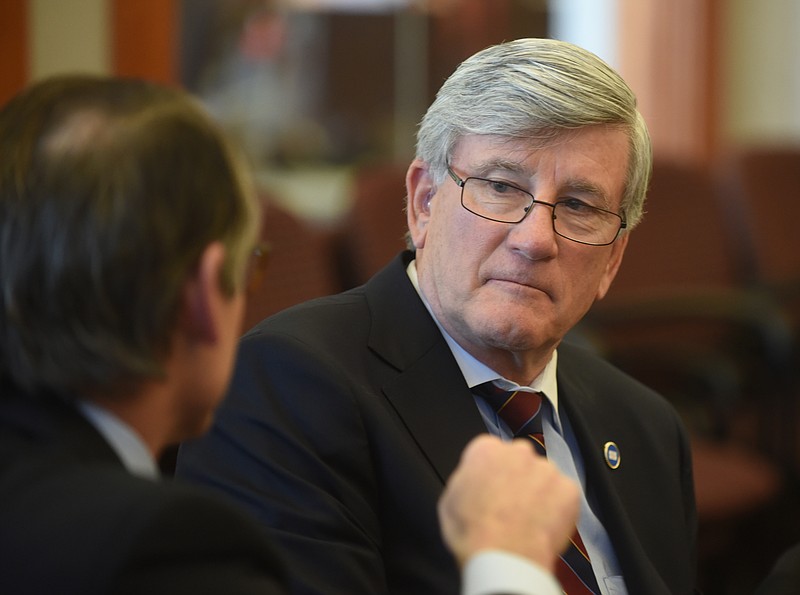NASHVILLE - Tennessee senators gave final approval Thursday to Gov. Bill Lee's proposal to repeal the state's amusement tax on smaller-size gym memberships.
But not before they first heard Republican Sen. Todd Gardenhire's 33-year-old story of Chattanooga power politics that led to the government-imposed advantage for large gyms.
And they also heard plenty from the senator as he warned about cutting sales taxes, the state's main source of revenue, without replacing them either by cuts in services or finding a new dedicated revenue stream.
"It's true that this one gym which was in Chattanooga got an exemption because they were competing against the YMCA," Gardenhire said. "But keep in mind, the YMCA did a lot of charity work and those who couldn't afford could get in if they could show they couldn't afford it."
Gardenhire was referring to a 1986 effort by the late Sen. Ward Crutchfield, D-Chattanooga, who pushed the amusement tax exemption for the Sports Barn, a for-profit sports facility founded by then-Chattem CEO Alex Guerry.
Guerry didn't think it was fair his 15,000-square-foot downtown facility had to charge the tax while a nearby competitor, the nonprofit YMCA, didn't. The tailor-made law exempted customers from paying state and local sales tax in their membership dues for any for-profit athletic facilities with at least 15,000 square feet that are open at least 70 hours a week and offer three or more programs such as racquetball, swimming and health.
Over the past two years, critics, led by the Tennessee chapter of the National Federation of Independent Businesses, have pushed to repeal the amusement tax repealed for smaller-size facilities, calling it unfair. Republican Lee picked up the crusade after becoming governor this year.
Proponents of eliminating the tax say it's an impediment for people to get fit in a state already known for its lousy health rankings.
"Here we're trying to discourage people to exercise by taxing it," Sen. Becky Duncan Massey said during debate.
Citing Tennesseans' dismal health rankings nationally, she said the state should not be making things more difficult on owners of small gyms.
In response, Gardenhire said he sought unsuccessfully over the last few years to make larger facilities collect the tax while cutting the rate for patrons at smaller gyms, thereby eliminating the unfair competitive advantage while ensuring it was "revenue neutral" in terms of its financial impact on state finances.
"No one likes taxes. I don't like taxes," the senator told colleagues. "I wish we could do away with all the taxes."
But he said the state sales tax has billions of dollars in exemptions already and all are for "worthy causes." The senator argued at the least, lawmakers should follow the example they set on the Hall Tax to repeal and phase out the amusement "instead of cutting it off" all at once.
Gardenhire also pointed out that a legislative fiscal note on his bill three years ago stated the estimated loss of revenue from the gym tax was around $18 million. This year the estimate began at $12 million and somehow now "it's $6 million just the other day in Finance Committee," he said.
There's an additional $2.5 million loss to local governments, according to a legislative fiscal note. Budget analysts also noted that it's not known if the smaller gyms would actually reduce their charges to customers to reflect there is no tax. The state tax is 7 percent and local governments can charge up to 2.75 percent.
After coughing and then sipping on a Coca-Cola on the Senate floor, Gardenhire said the $1.75 he spent on the soda could replace the taxes patrons pay for monthly gym memberships.
Minority Leader Jeff Yarbro, D-Nashville, said Gardenhire made "some important points" about "big guys" and "little guys" and treating businesses in the same field differently.
Moreover, Yarbro said, "if we're going to spend, dedicate $6 million in the budget to incentive exercise, there are probably more effective ways to do that." Nonetheless, he said he would vote to approve the bill.
Majority Leader Jack Johnson, R-Franklin, said "if you want less of something, tax it. I would submit to you that Tennessee is one of the most obese states in the nation," has one of the highest rates for diabetes "and the last thing we should be doing is taxing exercise, which is what we're doing."
The $6 million loss, Johnson argued, doesn't take into consideration the long-term health benefits for Tennesseans.
Finance Committee Chairman Bo Watson, R-Hixson, said that moving forward, "the lesson here is we need to be careful about how we execute our tax policy." It needs to be fair, he said.
But Watson said there's a "more important point" at stake.
As lawmakers consider Lee's proposed budget and begin offering their own amendments seeking to spend money, Watson said it is "critically important that we be sensitive to spending and recognize that the general fund has limitations."
Previously passed by the House, HB1138 cleared the Senate 29-1, with Gardenhire the lone no vote. One Democrat voted present.
Contact Andy Sher at asher@timesfreepress.com or 615-255-0550. Follow him on Twitter @AndySher1.
